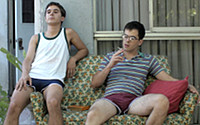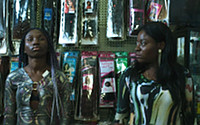| SHADOWS ON THE WALL | REVIEWS | NEWS | FESTIVAL | AWARDS | Q&A | ABOUT | TALKBACK | |||||||||||||||||||||||||||||||
 Shadows off the beaten path Shadows off the beaten path | |||||||||||||||||||||||||||||||
| Indies, foreigns, docs, revivals and shorts... | |||||||||||||||||||||||||||||||
|
On this page:
COLA DE MONO |
JOY TOUCH ME NOT | THE WILD PEAR TREE < < F O R E I G N > > last update 27.Nov.18 See also: SHADOWS FILM FESTIVAL | |||||||||||||||||||||||||||||||
| R E V I E W B Y R I C H C L I N E | |||||||||||||||||||||||||||||||
Cola de Mono

| |||||||||||||||||||||||||||||||
|
dir-scr Alberto Fuguet prd Alberto Fuguet, Sebastian Arriagada, Mauricio Varela with Santiago Rodriguez Costabal, Cristobal Rodriguez Costabal, Carmina Riego, Diego Nawrath, Benjamin Bou, Daniel Morera, Mauro Vaca, Vicente Almuna, Camilo Rojas Campos, Gustavo Astorga, Jesus Barrera, Antonio Gonzales  release US Jul.18 laof, Chl 12.Oct.18, UK 26.Nov.18
release US Jul.18 laof, Chl 12.Oct.18, UK 26.Nov.1818/Chile 1h42
|  With a heightened naturalism, this Chilean drama delves provocatively into the connections and disconnections between two brothers, including the psychology of their sexuality. It's an odd, dreamlike film that plays on the power of lust and desire as its central characters go on an all-night odyssey that has rippling repercussions. And as it shifts into a grim thriller, the film's mixed messages are challenging.
With a heightened naturalism, this Chilean drama delves provocatively into the connections and disconnections between two brothers, including the psychology of their sexuality. It's an odd, dreamlike film that plays on the power of lust and desire as its central characters go on an all-night odyssey that has rippling repercussions. And as it shifts into a grim thriller, the film's mixed messages are challenging.
On Christmas Eve in 1986 Santiago, brothers Vicente and Borja (real-life siblings Santiago and Cristobal Rodriguez Costabal) are hanging out in the summer heat while their mother (Riego) prepares dinner. She urges the teen Borja to grow up and reminds Vicente of their family heritage. As they drink cola de mono (literally "monkey's tail"), a traditional Chilean variation on egg nog, the alcohol loosens their conversation. Later, while Vicente goes cruising in the park, Borja breaks into his bedroom and finds his collection of gay porn. Filmmaker Fuguet creates a staccato tone, reflecting the intense interaction between mother and sons. Each is consumed with his or her own issues, giving the film a haunted sensibility. The way it skips around leaves some events a little fuzzy, reflecting the brothers' fragmented thoughts as well as deeper issues under the surface. Vicente hates the fact that he's attracted to men and is terrified that Borja has just discovered that they're both gay. There are also strong autobiographical angles to the film, as if Fuguet is expanding on his own coming-of-age. Performances have an earthy edge, intriguingly isolated even when actors are in scenes with each other, whcih lets the audience into the characters' heads. Cristobal has the more physical role, getting naked and revelling in his own physicality as he drunkenly explores his brother's room. Santiago's journey is more soulful, as he encounters both sex and violence ("cola" is also a Chilean homophobic insult), praying to God for strength to resist his urges. The way these boys grapple with each other is powerful, digging into each young man's personal connection to their family. It's perhaps unrealistic that their mother is surprised by any of this, especially when a darker secret emerges. "We're cursed," says Vicente, and when the story takes a heavy twist it may seem like that's true. Then the freaky final act, set 13 years later, delivers a wrenching shock. So amid the warmth and nastiness, the film reveals itself as a treatise on the devastation of Catholic guilt.
18 themes, language, violence, sexuality | 26.Nov.18
|
R E V I E W B Y R I C H C L I N E |
Joy | 
dir-scr Sudabeh Mortezai | prd Sabine Moser, Oliver Neumann with Anwulika Alphonsus, Mariam Sanusi, Angela Ekeleme  release UK Oct.18 lff,
release UK Oct.18 lff, US Oct.18 ciff, Aut 18.Jan.19 18/Austria 1h39 LONDON FILM FEST 
|  There's a documentary urgency to this drama that makes it feel bracingly authentic. In tracing the journey of a young woman who enters a pact to be trafficked from Nigeria to Austria, filmmaker Sudabeh Mortezai avoids any hint of a cautionary message: she simply follows the events with clear-eyed empathy. The narrative wobbles a bit in the third act, but what the film has to say is seriously important and darkly moving.
There's a documentary urgency to this drama that makes it feel bracingly authentic. In tracing the journey of a young woman who enters a pact to be trafficked from Nigeria to Austria, filmmaker Sudabeh Mortezai avoids any hint of a cautionary message: she simply follows the events with clear-eyed empathy. The narrative wobbles a bit in the third act, but what the film has to say is seriously important and darkly moving.
After making a juju pact with her village witch doctor, Joy (Alphonsus) travels to Vienna, working as a prostitute to repay the enormous debt to her madame (Ekeleme). She also takes newbie Precious (Sanusi) under her wing, encouraging her to get over her reluctance to take on this kind of work. Meanwhile, Joy's family is demanding more money from her to pay their medical bills, and a local cop is trying to get her to testify against her traffickers. But they can't promise her a visa, or any safety at all. After the ritual in Nigeria the film smash-cuts to a now blinged-up Joy on the wintry streets of Vienna. This informs everything that happens, from the arrival of Precious to a lively local African church service where Joy connects with her daughter, who lives with friends. The doc-style camerawork realistically shifts between working the streets and having a dance in the flat. And underneath all of this is a wrenching sense of uncertainty that holds the attention even when the story pacing stalls. Alphonsus is terrific as a strong woman who has made a decision to live this life. Joy's choices are limited: even after repaying her debt, she can only either become a madame or testify and "maybe" get asylum. But Alphonsus never plays her as a victim. Still, it's difficult to watch knowing she will surely encounter violence at some point. And she gets deeply attached to Precious, who is sharply played by Sanusi, transformed from timid newbie into a steel-eyed fighter who takes inspiration from Michelle Obama and Beyonce. Mortezai fills the screen with heart-stopping moments as these women offer help and advice on how to survive this life. And the script also includes pointed observations about the way family back home are also abusive. But the most eye-opening moment is when Joy goes behind the curtain, seeking to gain her own power over these vulnerable women who can't seek justice for fear of deportation, danger to their families and that juju curse. And Mortezai's most clever touch is to point out that Nigeria isn't the only country with long-standing superstitions.
15 themes, language, violence | 10.Nov.18 tiff
R E V I E W B Y R I C H C L I N E |
Touch Me Not
| 
dir-scr Adina Pintilie | prd Philippe Avril, Bianca Oana, Adina Pintilie with Laura Benson, Adina Pintilie, Tomas Lemarquis, Christian Bayerlein, Hanna Hofmann, Grit Uhlemann, Seani Love, Irmena Chichikova, Rainer Steffen, Georgi Naldzhiev, Dirk Lange, Annett Sawallisch  release Ger 1.Nov.18, UK Oct.18 lff 18/Germany 2h03 TORONTO FILM FEST LONDON FILM FEST 
|  Exploring intimacy using a blended approach that includes both fictional narrative and documentary elements, this film isn't easy to categorise. Its plot is loose, but there's a strong sense of momentum in the internal journeys of a handful of characters, including filmmaker Adina Pintilie herself. Rather too full-on for mainstream audiences, more adventurous viewers will find themselves prodded into examining their own physicality more honestly.
Exploring intimacy using a blended approach that includes both fictional narrative and documentary elements, this film isn't easy to categorise. Its plot is loose, but there's a strong sense of momentum in the internal journeys of a handful of characters, including filmmaker Adina Pintilie herself. Rather too full-on for mainstream audiences, more adventurous viewers will find themselves prodded into examining their own physicality more honestly.
A 50ish British woman in Germany, Laura (Benson) is working with filmmaker Adina (Pintilie) on a project about physical intimacy. Laura is terrified of letting anyone touch her, so goes through various experiments to confront her perception. This includes watching a male prostitute (Naldzhiev), conversing with a trans female hooker (Hofmann) and consulting a tactile therapist (Love). But most moving for Laura is watching Tomas and Christian (Lemarquis and Bayerlein) interact in an unusual physio session for a group of differently abled patients. As these men build a friendship, they learn to honestly express themselves. While the story and characters are fictional, the actors are playing blurred versions of themselves linked to their own physicalities. It's a remarkable approach, most sharply portrayed in therapy sessions in which people touch and share feelings while discussing their relationships, body images and personal interests. This breaks down barriers between the audience and the people on-screen. And it also adds power to the more dramatic elements, such as when Laura starts stalking Tomas. While playing themselves, the actors are also required to have a remarkable transparency, creating characters the viewer connects with. Benson adds continual yearning as a woman who wants to change but struggles with her physical responses. A key moment has her playfully swapping places with Pintile. Hofmann's scenes are awkward and remarkably tender. Lemarquis reveals how he learned to hide his emotions. And Bayerlein is the most memorable, a severely disabled man who is happy he doesn't have to worry about norms. There are times when the film feels like a peep show, spying on these intimate moments. And it often feels like it's merely a flurry of ideas without any momentum, never headed anywhere. But along the way, bigger themes resolve. Bayerlin makes the observation that dividing everything into good and bad comes from medieval Christianity, but it's not how the world works. So when it comes to intimacy, trust, desire and safety, there's no right or wrong. Each of us is on a journey, so it's normal to feel that we're not OK.
18 themes, language, sexuality | 5.Nov.18 tiff
|
R E V I E W B Y R I C H C L I N E |
The Wild Pear Tree |  Ahlat Agaci Ahlat Agaci
dir Nuri Bilge Ceylan | prd Zeynep Ozbatur Atakan, Muzaffer Yildirim scr Akin Aksu, Ebru Ceylan, Nuri Bilge Ceylan with Aydin Dogu Demirkol, Murat Cemcir, Bennu Yildirimlar, Hazar Erguclu, Asena Keskinci, Serkan Keskin, Akin Aksu, Oner Erkan, Tamer Levent, Kubilay Tuncer, Kadir Cermik, Ahmet Rifat Sungar  release Tur 1.Jun.18, UK 30.Nov.18, US 30.Jan.19 18/Turkey 3h08 TORONTO FILM FEST
|  Gorgeously shot in both city and countryside, this dense, textured Turkish drama gets under the skin of its characters to explore the natural order, personal desires and communal responsibility. It's also an intriguing look at the fine line between cynicism and bitterness. Filmmaker Nuri Bilge Ceylan is an expert at observing character detail while capturing expansive settings. And extended running times.
Gorgeously shot in both city and countryside, this dense, textured Turkish drama gets under the skin of its characters to explore the natural order, personal desires and communal responsibility. It's also an intriguing look at the fine line between cynicism and bitterness. Filmmaker Nuri Bilge Ceylan is an expert at observing character detail while capturing expansive settings. And extended running times.
After finishing university, aspiring writer Sinan (Demirkol) returns to Canakkale, where his over-relaxed dad Idris (Cemcir), sarcastic mother (Yildirimlar) and feisty sister Yasemin (Keskinci) greet him as if he never left. Dad immediately drags him back into local life, and Sinan is further annoyed by people asking him to repay his father's gambling debts. Meanwhile, Sinan needs cash to publish his book of observational stories about the region. He also reconnects with old friend Hatice (Erguclu), who's grown up now and seems to be messing with him. In this place, education and artistry aren't as valued as strong-armed masculinity. So schoolteacher Idris has his own daddy issues. The local mayor (Cermik) has an open door policy, but brushes off Sinan's funding request because his book isn't aimed at tourists. So he tries a businessman (Tuncer) instead. The film is structured as a series of encounters as Sinan moves around talking to people, seeking advice, support or some other provocation. This cleverly echoes the "quirky meta novel" structure of the book he has written. The actors play each scene with almost startling believability, creating fully formed characters who seem to have a vivid life off-screen. There's an earthy, naturalistic ease to Demirkol's performance as an observant young man who sees conflicting ideas everywhere. But then he's the one who provokes a revered author (Keskin) into a rage. And most of his discussions dissolve into arguments, tears or punches. By deliberate contrast, Cemcir's Idris has made peace with these internal battles, clearly with the help of his vices. Ceylon tightly packs the film with contrasting attitudes separated by generations, religions, politics and the urban/rural divide. Each conversation swirls around these themes, which makes this very long film feel over-weighted. But there isn't a dull scene, including a lively extended chat between Sinan and two imams (Aksu and Erkan) while strolling into town. All of which adds up to a pungent odyssey about morality and values. If the world is changing, who's being left behind?
15 themes, language, violence | 26.Nov.18 

See also: SHADOWS FILM FESTIVAL © 2018 by Rich Cline, Shadows
on the Wall
| ||||||||||||